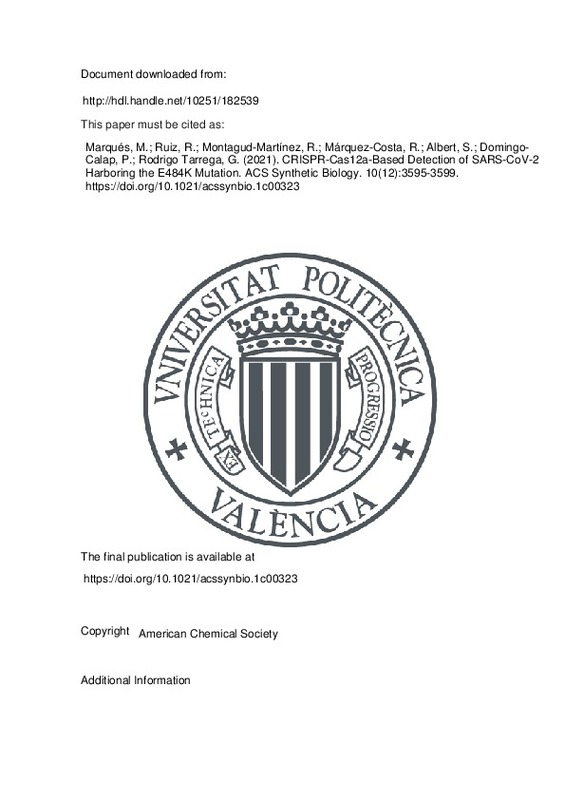JavaScript is disabled for your browser. Some features of this site may not work without it.
Buscar en RiuNet
Listar
Mi cuenta
Estadísticas
Ayuda RiuNet
Admin. UPV
CRISPR-Cas12a-Based Detection of SARS-CoV-2 Harboring the E484K Mutation
Mostrar el registro sencillo del ítem
Ficheros en el ítem
| dc.contributor.author | Marqués, María-Carmen
|
es_ES |
| dc.contributor.author | Ruiz, Raúl
|
es_ES |
| dc.contributor.author | Montagud-Martínez, Roser
|
es_ES |
| dc.contributor.author | Márquez-Costa, Rosa
|
es_ES |
| dc.contributor.author | Albert, Sandra
|
es_ES |
| dc.contributor.author | Domingo-Calap, Pilar
|
es_ES |
| dc.contributor.author | Rodrigo Tarrega, Guillermo
|
es_ES |
| dc.date.accessioned | 2022-05-11T18:06:12Z | |
| dc.date.available | 2022-05-11T18:06:12Z | |
| dc.date.issued | 2021-12-17 | es_ES |
| dc.identifier.uri | http://hdl.handle.net/10251/182539 | |
| dc.description.abstract | [EN] The novel respiratory virus SARS-CoV-2 is rapidly evolving across the world with the potential of increasing its transmission and the induced disease. Here, we applied the CRISPR-Cas12a system to detect, without the need of sequencing, SARS-CoV-2 genomes harboring the E484K mutation, first identified in the Beta variant and catalogued as an escape mutation. The E484K mutation creates a canonical protospacer adjacent motif for Cas12a recognition in the resulting DNA amplicon, which was exploited to obtain a differential readout. We analyzed a series of fecal samples from hospitalized patients in Valencia (Spain), finding one infection with SARS-CoV-2 harboring the E484K mutation, which was then confirmed by sequencing. Overall, these results suggest that CRISPR diagnostics can be a useful tool in epidemiology to monitor the spread of escape mutations. | es_ES |
| dc.description.sponsorship | We thank M. Carmen Montaner, Javier Peman, Miguel Salavert, and Alba Ruiz from the Hospital Universitario y Politecnico La Fe for their support in the collection of the fecal samples. This work was supported by the Fondo Supera COVID-19 from CRUE and Banco Santander (Grant COV-CRISPIS, BOE-A-2020-7995, to GR), the CSIC PTI Salud Global (Grant SGL2021-03-040, to GR, and Grants 202020E292 and SGL2103034, to PDC) through the European Union-Next Generation EU, the Fondo COVID-19 from the Instituto de Salud Carlos III (Grant COV20/00210, to PDC), and the Generalitat Valenciana (Grant SEJI/2020/011, to GR). PDC was supported by the Ramon y Cajal program (RYC2019-028015-I) and RMC by a predoctoral fellowship (PRE2019-088531), both from the Spanish Ministerio de Ciencia e Innovacion. | es_ES |
| dc.language | Inglés | es_ES |
| dc.publisher | American Chemical Society | es_ES |
| dc.relation.ispartof | ACS Synthetic Biology | es_ES |
| dc.rights | Reserva de todos los derechos | es_ES |
| dc.subject | CRISPR diagnostics | es_ES |
| dc.subject | Epidemiological surveillance | es_ES |
| dc.subject | Virus evolution | es_ES |
| dc.title | CRISPR-Cas12a-Based Detection of SARS-CoV-2 Harboring the E484K Mutation | es_ES |
| dc.type | Artículo | es_ES |
| dc.identifier.doi | 10.1021/acssynbio.1c00323 | es_ES |
| dc.relation.projectID | info:eu-repo/grantAgreement/CSIC//SGL2021-03-040/ | es_ES |
| dc.relation.projectID | info:eu-repo/grantAgreement/CSIC//202020E292/ | es_ES |
| dc.relation.projectID | info:eu-repo/grantAgreement/CSIC//SGL2103034/ | es_ES |
| dc.relation.projectID | info:eu-repo/grantAgreement/ISCIII//COV20%2F00210/ | es_ES |
| dc.relation.projectID | info:eu-repo/grantAgreement/GVA//SEJI%2F2020%2F011/ | es_ES |
| dc.relation.projectID | info:eu-repo/grantAgreement/MCIU//RYC2019-028015-I//Ramón y Cajal program/ | es_ES |
| dc.relation.projectID | info:eu-repo/grantAgreement/MICINN//PRE2019-088531/ | es_ES |
| dc.rights.accessRights | Abierto | es_ES |
| dc.contributor.affiliation | Universitat Politècnica de València. Instituto Universitario Mixto de Biología Molecular y Celular de Plantas - Institut Universitari Mixt de Biologia Molecular i Cel·lular de Plantes | es_ES |
| dc.description.bibliographicCitation | Marqués, M.; Ruiz, R.; Montagud-Martínez, R.; Márquez-Costa, R.; Albert, S.; Domingo-Calap, P.; Rodrigo Tarrega, G. (2021). CRISPR-Cas12a-Based Detection of SARS-CoV-2 Harboring the E484K Mutation. ACS Synthetic Biology. 10(12):3595-3599. https://doi.org/10.1021/acssynbio.1c00323 | es_ES |
| dc.description.accrualMethod | S | es_ES |
| dc.relation.publisherversion | https://doi.org/10.1021/acssynbio.1c00323 | es_ES |
| dc.description.upvformatpinicio | 3595 | es_ES |
| dc.description.upvformatpfin | 3599 | es_ES |
| dc.type.version | info:eu-repo/semantics/publishedVersion | es_ES |
| dc.description.volume | 10 | es_ES |
| dc.description.issue | 12 | es_ES |
| dc.identifier.eissn | 2161-5063 | es_ES |
| dc.identifier.pmid | 34783536 | es_ES |
| dc.identifier.pmcid | PMC8610009 | es_ES |
| dc.relation.pasarela | S\450186 | es_ES |
| dc.contributor.funder | Banco Santander | es_ES |
| dc.contributor.funder | Generalitat Valenciana | es_ES |
| dc.contributor.funder | Instituto de Salud Carlos III | es_ES |
| dc.contributor.funder | Ministerio de Ciencia e Innovación | es_ES |
| dc.contributor.funder | Consejo Superior de Investigaciones Científicas | es_ES |
| dc.contributor.funder | Ministerio de Ciencia, Innovación y Universidades | es_ES |







![[Cerrado]](/themes/UPV/images/candado.png)

